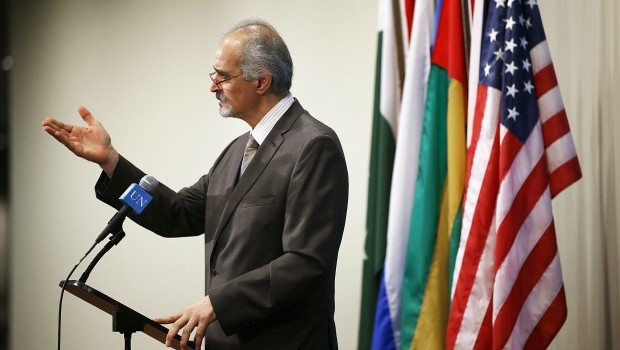
Syrian ambassador to the United Nations Bashar Ja’afari speaks to reporters outside the Security Council following the introduction of a draft resolution calling for UN authority to protect Syrian civilians on August 28, 2013 in New York City. (Mario Tama/Getty Images/AFP)
Speaking earlier on Wednesday, a Downing Street spokesman said: “Britain has drafted a resolution condemning the attack by the Assad regime, and authorizing all necessary measures under Chapter 7 of the UN Charter to protect civilians from chemical weapons. The resolution will be put forward at a meeting of the 5 permanent members of the Security Council later today in New York.”
The meeting was ongoing at the time of writing, and the draft resolution is expected to be strongly resisted by Russia and China, which both have the power of veto as permanent members of the council.
The US, UK and France, which have pushed for action in response to last week’s alleged chemical attack on the Damascus suburbs, are also coming under pressure to delay any response until UN inspectors on the ground in Syria have gathered and analyzed evidence from the scene of the alleged attack, or until the Security Council authorizes any intervention.
UN secretary-general Ban Ki-moon told reporters on Wednesday that the inspectors would need another four days to produce a comprehensive report.
He said: “[The inspectors] are working very hard, under very, very dangerous circumstances. . . . Let them conclude their work for four days, and then we will have to analyze scientifically with experts and then I think we will have to report to the Security Council for any actions.”
Meanwhile, speaking on the same day, the joint UN—Arab League envoy for Syria, Lakhdar Brahimi, said that chemical weapons had probably been used last week, and that any military action still required authorization by the Security Council to be legitimate.
Despite calls for delay, analysts speculated that the US and its allies would proceed even without UN approval. Michael Stephens, director of the Qatar branch of the British security think tank RUSI, said that he would not be surprised to see the US and its allies launch some kind of military strike, possibly with cruise missiles, by the end of the week.
“It is almost a formality that an attack will take place,” he added. “The West is preparing their public for the attack, rather than discussing it as a possibility.”
He also said he had heard speculation that the US, UK and France may attempt to use the unusual step of bypassing the Security Council and appealing directly to the General Assembly.
“This would not give the operation legality,” he said, but would allow the West to say the world was in agreement regarding the necessity of stopping the use of chemical weapons.
